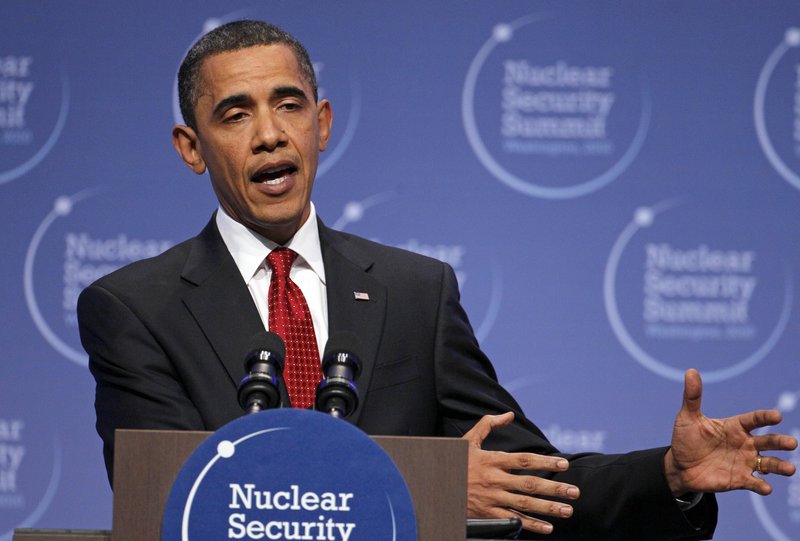WASHINGTON – The leaders of 49 nations, summoned to action by President Obama, agreed Tuesday to a voluntary but far-reaching program to keep thousands of tons of weapons-grade nuclear materials scattered around the world from falling into terrorists’ hands.
World leaders gathered at a two-day conference vowed an unprecedented effort to crack down on nuclear smuggling, step up the sharing of nuclear information, and help develop common standards and procedures for the physical security of fissile materials.
Obama said the agreement, spelled out in a final communique, recognized a “cruel irony of history”: that after surviving a Cold War arms race and the threat of nuclear war, the world must confront the even larger danger of nuclear terrorism.
“Terrorist networks such as al-Qaida have tried to acquire the material for a nuclear weapon, and if they ever succeed, they would surely use it,” he said. “Were they to do so, it would be a catastrophe for the world.”
Yet the four-year plan that emerged is highly ambitious, as Obama himself acknowledged during a news conference. It necessitates a crackdown on thousands of sites — at civilian nuclear installations, military and university sites — at a likely cost of many billions of dollars.
Obama acknowledged that there is no way to enforce the agreement except through the good intentions of world leaders who, he said, now share his view of the urgency of the program.
“We’re relying on good will on the part of those who are signatories,” he said Tuesday afternoon. “I believe they take their commitments very seriously.”
Gary Samore, a senior National Security Council official, told reporters that enforcement mechanisms for national security policies are “not attainable.”
“The effort to try to create such a regime would distract our efforts from the near-term need to secure these materials,” he said.
Although cooperation with neighbors is important to halting nuclear smuggling, many countries in regions such as the Middle East and South Asia likely will be reluctant to cooperate with neighbors of whom they are suspicious.
And many countries are generally wary of sharing information about their sites with other world powers, or even world organizations, such as the U.N.”s International Atomic Energy Agency, that will be involved in the new program.
The communique acknowledges the rights of countries to pursue peaceful uses of nuclear power, a principle important to many developing countries. Indeed, many countries may take the view that international pressure to safeguard nuclear materials infringes on their rights to develop nuclear power — a view taken by Iran, for example.
Even as the agreement was discussed, Obama and other U.S. officials were pressing countries on the sidelines to cooperate in preparation of a new round of U.N. Security Council sanctions against Iran.
The nuclear security program sets out a series of objectives for participating countries.
They are urged to ratify two international treaties on the handling of nuclear materials. They also are asked to convert research reactors that use highly enriched uranium — which can be used in nuclear weapons — to low-enriched uranium, which isn’t bomb grade.
The security program envisions that wealthier nations will help defray the cost of the effort for poorer ones. The United States has budgeted $3 billion in the current fiscal year for better securing nuclear material.
There are 1,600 tons of highly enriched uranium and 500 tons of plutonium at risk in sites around the world, experts say, enough to build between 100,000 to 120,000 nuclear warheads. The highly enriched uranium is preferred by terrorist organizations because uranium-based nuclear bombs have a relatively straightforward design compared with plutonium weapons.
Copy the Story Link
Send questions/comments to the editors.



Success. Please wait for the page to reload. If the page does not reload within 5 seconds, please refresh the page.
Enter your email and password to access comments.
Hi, to comment on stories you must . This profile is in addition to your subscription and website login.
Already have a commenting profile? .
Invalid username/password.
Please check your email to confirm and complete your registration.
Only subscribers are eligible to post comments. Please subscribe or login first for digital access. Here’s why.
Use the form below to reset your password. When you've submitted your account email, we will send an email with a reset code.